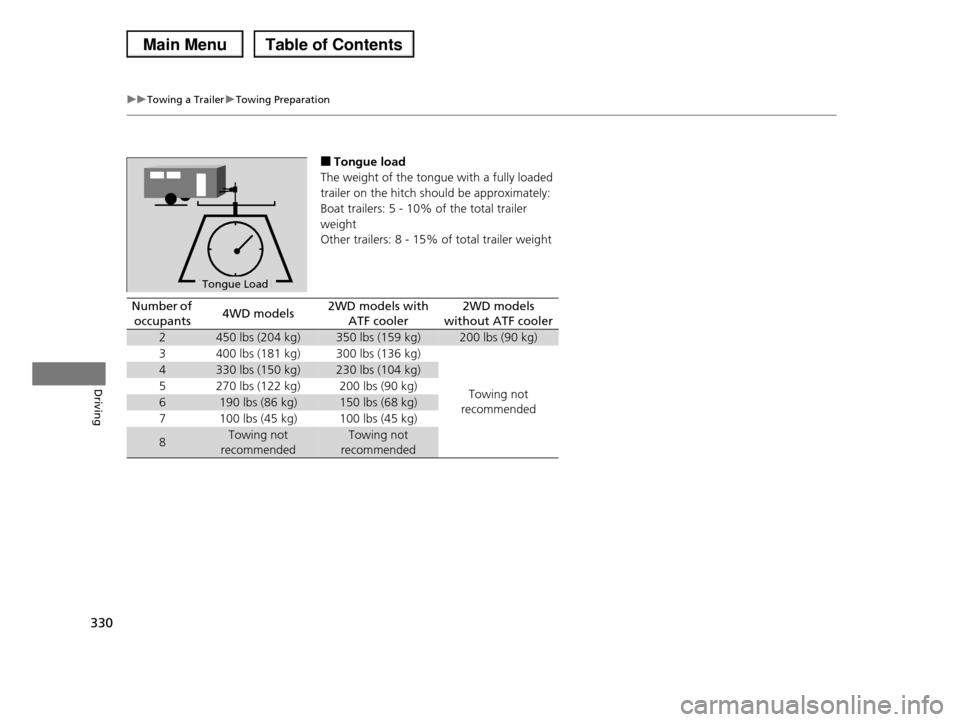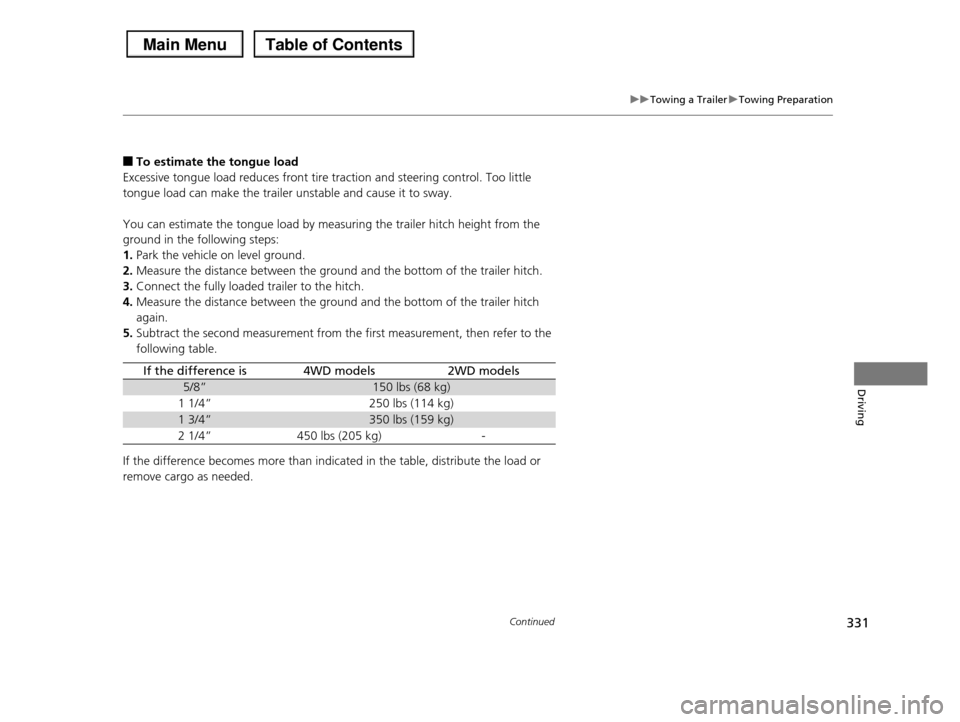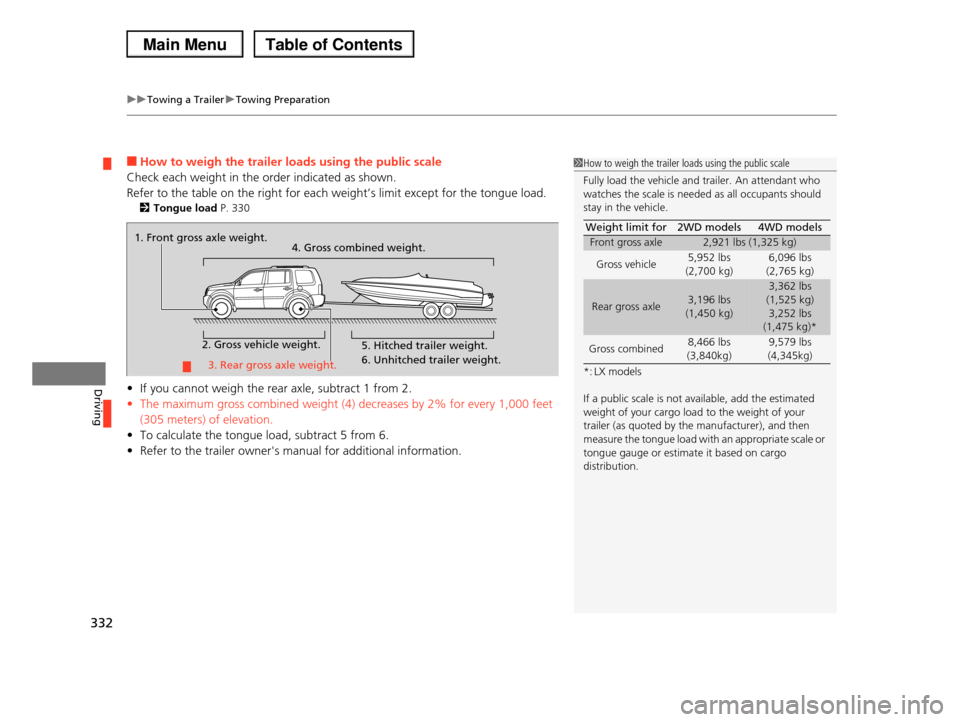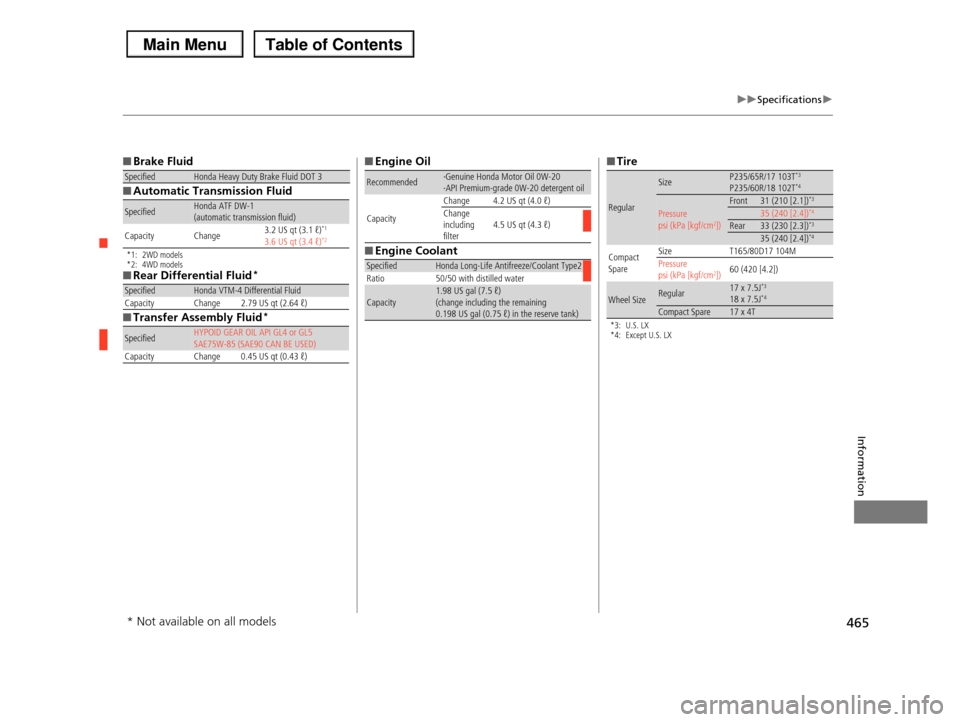2013 HONDA PILOT 4WD
[x] Cancel search: 4WDPage 330 of 488

329Continued
Driving
Towing a Trailer
Towing Preparation
Your vehicle can tow a trailer if you carefully observe the load limits, use the proper
equipment, and follow the towing guidelines. Check the load limits before driving.
■Total trailer weight
Do not exceed the maximum allowable
weight of the trailer, cargo, and everything in
or on it shown in the table.
Towing loads in excess of this can seriously
affect vehicle handling and performance and
can damage the engine and drivetrain.
Each weight limit is calculated based on the following conditions:
•Occupants fill seats from the front of the vehicle to the back
•Each occupant weights 150 lbs (68 kg)
•Each occupant has 15 lbs (7 kg) of cargo in the cargo area
Any additional weight, cargo or accessories reduce the maximum trailer weight and
maximum tongue load.
■Towing Load Limits1Towing Load Limits
Check if all loads are within limits at a public scale.
If a public scale is not available, add the estimated
weight of your cargo load to the weight of your trailer (as quoted by the manufacturer), and then
measure the tongue load with an appropriate scale or
tongue gauge or estimate it based on cargo distribution.
Refer to the trailer owner's manual for additional information.
Break-in Period Avoid towing a trailer during your vehicle's first 600
miles (1,000 km).
Never exceed the gross weight ratings.
Gross weight information
2Vehicle Specifications P. 464
3WARNING
Exceeding any load limit or improperly
loading your vehicle and trailer can cause a
crash in which you can be seriously hurt or
killed.
Check the loading of your vehicle and
trailer carefully before starting to drive.
Total Load
Number of
occupants4WD models2WD models with
ATF cooler
2WD models
without ATF cooler
24,500 lbs (2,041 kg)3,500 lbs (1,588 kg)2,000 lbs (905 kg)
34,300 lbs (1,950 kg)3,300 lbs (1,497 kg)
Towing not
recommended
44,100 lbs (1,860 kg)3,100 lbs (1,406 kg)
54,000 lbs (1,814 kg)3,000 lbs (1,361 kg)
63,800 lbs (1,724 kg)2,800 lbs (1,270 kg)
72,000 lbs (905 kg)2,000 lbs (905 kg)
8Towing not
recommended
Towing not
recommended
Page 331 of 488

330
uuTowing a TraileruTowing Preparation
Driving
■Tongue load
The weight of the tongue with a fully loaded
trailer on the hitch should be approximately:
Boat trailers: 5 - 10% of the total trailer
weight
Other trailers: 8 - 15% of total trailer weight
To ngue LoadTongue Load
Number of
occupants4WD models2WD models with
ATF cooler
2WD models
without ATF cooler
2450 lbs (204 kg)350 lbs (159 kg)200 lbs (90 kg)
3400 lbs (181 kg)300 lbs (136 kg)
Towing not
recommended
4330 lbs (150 kg)230 lbs (104 kg)
5270 lbs (122 kg)200 lbs (90 kg)
6190 lbs (86 kg)150 lbs (68 kg)
7100 lbs (45 kg)100 lbs (45 kg)
8Towing not
recommended
Towing not
recommended
Page 332 of 488

331
uuTowing a TraileruTowing Preparation
Continued
Driving
■To estimate the tongue load
Excessive tongue load reduces front tire traction and steering control. Too little
tongue load can make the trailer unstable and cause it to sway.
You can estimate the tongue load by measuring the trailer hitch height from the
ground in the following steps:
1.Park the vehicle on level ground.
2.Measure the distance between the ground and the bottom of the trailer hitch.
3.Connect the fully loaded trailer to the hitch.
4.Measure the distance between the ground and the bottom of the trailer hitch
again.
5.Subtract the second measurement from the first measurement, then refer to the
following table.
If the difference becomes more than indicated in the table, distribute the load or
remove cargo as needed.
If the difference is4WD models2WD models
5/8”150 lbs (68 kg)
1 1/4”250 lbs (114 kg)
1 3/4”350 lbs (159 kg)
2 1/4”450 lbs (205 kg)-
Page 333 of 488

uuTowing a TraileruTowing Preparation
332
Driving
■How to weigh the trailer loads using the public scale
Check each weight in the order indicated as shown.
Refer to the table on the right for each weight’s limit except for the tongue load.
2Tongue load P. 330
•If you cannot weigh the rear axle, subtract 1 from 2.
•The maximum gross combined weight (4) decreases by 2% for every 1,000 feet
(305 meters) of elevation.
•To calculate the tongue load, subtract 5 from 6.
•Refer to the trailer owner's manual for additional information.
1How to weigh the trailer loads using the public scale
Fully load the vehicle and trailer. An attendant who watches the scale is needed as all occupants should
stay in the vehicle.
*: LX models
If a public scale is not available, add the estimated
weight of your cargo load to the weight of your
trailer (as quoted by the manufacturer), and then measure the tongue load with an appropriate scale or
tongue gauge or estimate it based on cargo
distribution.
Weight limit for 2WD models 4WD models
Front gross axle2,921 lbs (1,325 kg)
Gross vehicle5,952 lbs
(2,700 kg)
6,096 lbs
(2,765 kg)
Rear gross axle3,196 lbs
(1,450 kg)
3,362 lbs
(1,525 kg)
3,252 lbs (1,475 kg)*
Gross combined8,466 lbs
(3,840kg)
9,579 lbs
(4,345kg)
1. Front gross axle weight.
2. Gross vehicle weight.
4. Gross combined weight.
3. Rear gross axle weight.
5. Hitched trailer weight.
6. Unhitched trailer weight.
Page 465 of 488

464
Information
Specifications
■Vehicle Specifications
*1: 2WD models *2: 4WD models*3: LX models with 4WD*4: Except LX models with 4WD
ModelHonda PilotNo. of Passengers: Front 2Second 3Third 3Total 8Weights:Gross Vehicle Weight Rating U.S.: 5,953 lbs (2,700 kg)*1
6,096 lbs (2,765 kg)*2
Canada: 2,700 kg*1
2,765 kg*2
Gross Axle Weight Rating (Front)U.S.: 2,921 lbs (1,325 kg)Canada: 1,325 kgGross Axle Weight Rating (Rear)U.S.: 3,197 lbs (1,450 kg)*1
3,251 lbs (1,475 kg)*3
3,362 lbs (1,525 kg)*4
Canada: 1,450 kg*1
1,525 kg*2
Air Conditioning:Refrigerant Type HFC-134a (R-134a)Charge Quantity21.2 – 22.9 oz (600 – 650 g)Lubricant TypeND-OIL8
■Engine Specifications
■Fuel
■Battery
■Washer Fluid
Displacement212 cu-in (3,471 cm3)Spark Plugs NGK DILZKR7A11G
Fuel:TypeUnleaded gasoline, Pump octane number of 87 or higherFuel Tank Capacity 21.0 US gal (79.5 ℓ)
Capacity/Type60AH(5)/72AH(20)
Tank CapacityU.S.: 4.2 US qt (4.0 ℓ)Canada: 6.9 US qt (6.5 ℓ)
■Light Bulbs
*5: Not available on all models
Headlights (Low Beam)55W (H11)Headlights (High Beam) 60 W (HB3)Daytime Running Lights60 W (HB3)Fog Lights*555W (H11)Front Turn Signal/Parking Lights28/8W (Amber)Side Turn Signal Lights (on Door Mirrors)*5 LED
Front Side Marker Lights3CPRear Side Marker Lights 5WBrake/Taillights21/5WBack-Up Lights 18WRear Turn Signal/Taillights21/5WHigh-Mount Brake Light 5WRear License Plate Light5WInterior LightsMap Lights (Front) 8W Map Lights (Rear) 4CPDoor Courtesy Lights 2CPConsole Compartment Light1.4W
Glove Box Light 1.4W Foot Light LEDCargo Area Light 8WVanity Mirror Lights 1.4W
Page 466 of 488

465
uuSpecificationsu
Information
■Brake Fluid
■Automatic Transmission Fluid
*1: 2WD models *2: 4WD models■Rear Differential Fluid*
■Transfer Assembly Fluid*
SpecifiedHonda Heavy Duty Brake Fluid DOT 3
SpecifiedHonda ATF DW-1 (automatic transmission fluid)
Capacity Change3.2 US qt (3.1 ℓ)*1
3.6 US qt (3.4 ℓ)*2
SpecifiedHonda VTM-4 Differential FluidCapacity Change 2.79 US qt (2.64 ℓ)
SpecifiedHYPOID GEAR OIL API GL4 or GL5 SAE75W-85 (SAE90 CAN BE USED)Capacity Change 0.45 US qt (0.43 ℓ)
■Engine Oil
■Engine Coolant
Recommended·Genuine Honda Motor Oil 0W-20·API Premium-grade 0W-20 detergent oil
Capacity
Change 4.2 US qt (4.0 ℓ) Change including filter4.5 US qt (4.3 ℓ)
SpecifiedHonda Long-Life Antifreeze/Coolant Type2Ratio 50/50 with distilled water
Capacity1.98 US gal (7.5 ℓ) (change including the remaining 0.198 US gal (0.75 ℓ) in the reserve tank)
■Tire
*3: U.S. LX *4: Except U.S. LX
Regular
SizeP235/65R/17 103T*3
P235/60R/18 102T*4
Pressure psi (kPa [kgf/cm2])
Front31 (210 [2.1])*3
35 (240 [2.4])*4
Rear33 (230 [2.3])*3
35 (240 [2.4])*4
Compact Spare
SizeT165/80D17 104MPressure psi (kPa [kgf/cm2])60 (420 [4.2])
Wheel SizeRegular17 x 7.5J*3
18 x 7.5J*4
Compact Spare17 x 4T
* Not available on all models